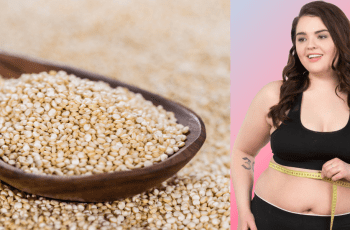When it comes to weight loss, there are countless strategies and approaches available. From calorie counting to intense workouts, it’s easy to get overwhelmed with all the options. However, one area that has gained attention in recent years is the role of probiotics in promoting weight loss.
Probiotics, which are friendly bacteria found in fermented foods or taken in supplement form, have been recognized for their potential benefits in supporting overall gut health. But can they actually help with weight loss? In this article, I will explore the facts surrounding probiotics and their connection to weight management.
Probiotics Promote Weight Loss
- Probiotics are friendly bacteria that can be found naturally in fermented foods or taken in supplement form.
- Studies show that certain probiotic strains may slow down weight gain and promote weight loss in animals, but more research is needed in humans.
- Your gut bacteria, known as the microbiome, influence weight regulation and metabolism.
- Probiotics can affect metabolism by aiding in nutrient breakdown and influencing the absorption of vitamins and minerals.
- While more research is needed, probiotics can still play a role in supporting overall health and healthy weight management.
The Role of Gut Bacteria in Weight Management
Your gut contains trillions of bacteria, collectively known as the microbiome. These bacteria work together to break down nutrients, medications, and fibers, as well as protect against harmful germs. Studies have shown that the balance of different bacterial families, such as bacteroidetes and firmicutes, can affect body weight.
People with obesity tend to have less diverse gut bacteria compared to those with a healthy weight. Additionally, some studies have found that transplanting gut bacteria from obese mice into lean mice can induce obesity. While the exact mechanisms are not fully understood, it is clear that gut bacteria play a significant role in weight management.

The diverse range of gut bacteria influences various aspects of our metabolism, including the breakdown and absorption of nutrients. Certain strains of gut bacteria may be more efficient at extracting calories from food, potentially contributing to weight gain. Additionally, the bacterial composition of the gut can influence inflammation, fat storage, and hormonal signaling, all of which can impact weight regulation.
Improving gut bacteria diversity and balance through diet and lifestyle changes may be a potential strategy for weight management. Consuming a diet rich in fiber, which serves as a prebiotic and promotes the growth of beneficial gut bacteria, can be beneficial. Similarly, including fermented foods, such as yogurt, kimchi, and sauerkraut, in your diet can provide a source of probiotics that support a healthy gut microbiome.
While the precise relationship between gut bacteria and weight management is still being unravelled, it is clear that harnessing the power of gut bacteria can have a profound impact on our overall health and well-being. Taking care of our gut health, nurturing a diverse microbiome, and considering the role of probiotics are steps towards a comprehensive approach to maintain a healthy weight.
How Probiotics Affect Weight Loss
The specific ways in which probiotics affect weight loss are not yet fully understood. However, studies suggest that certain probiotic strains can have a significant impact on various aspects of weight management.
Appetite Regulation
Probiotics have been found to influence appetite regulation, which can play a role in weight loss. Some probiotics produce short-chain fatty acids, such as acetate, propionate, and butyrate. These fatty acids have been shown to help suppress appetite and increase fat excretion, potentially aiding in weight loss.
Fat Absorption
Certain strains of probiotics, particularly those from the Lactobacillus family, have been found to affect fat absorption in the body. These strains can increase the production of fat-regulating proteins, potentially leading to improved fat metabolism and weight management.
Hormonal Regulation
Probiotics have also been shown to have a role in hormonal regulation, which can impact weight loss. Some probiotics have the ability to release appetite-regulating hormones, such as peptide YY and glucagon-like peptide-1. These hormones help regulate appetite and can contribute to a healthier weight.
Anti-Obesity Effects
Additionally, probiotics have been studied for their potential anti-obesity effects. By improving gut health and reducing inflammation, probiotics may help protect against obesity and its associated health risks.

While more research is needed to fully understand the mechanisms by which probiotics affect weight loss, these findings highlight the potential benefits of incorporating probiotics into a weight management plan. By influencing appetite, fat absorption, hormonal regulation, and overall gut health, probiotics show promise as a tool for supporting healthy weight management.
Probiotics and Weight Loss Studies
Multiple studies have delved into the effects of probiotics on weight loss, shedding light on their potential effectiveness. Some research has discovered that specific probiotic strains, such as Lactobacillus gasseri, Lactobacillus fermentum, and Lactobacillus rhamnosus, can yield noteworthy reductions in body fat, waist circumference, and BMI. For instance, a study involving the consumption of yogurt containing Lactobacillus fermentum or Lactobacillus amylovorus resulted in a decrease in body fat percentage.
Furthermore, another investigation revealed that women who took Lactobacillus rhamnosus supplements experienced 50% more weight loss than those taking a placebo. Among the array of probiotic strains, Lactobacillus gasseri has emerged as one of the most promising in terms of aiding weight loss in both animal and human studies.
However, it’s crucial to note that not all probiotic strains have been found to foster weight loss, and individual responses may vary. The diverse outcomes observed in different studies emphasize the importance of further research to enhance our understanding of how probiotics can contribute to weight loss.
Conclusion
While the research on probiotics and weight loss is still evolving, they can play a role in supporting a healthy weight and overall gut health. Probiotics have been studied for their potential effects on weight management, with specific strains like Lactobacillus gasseri showing promising results. However, more research is needed to determine the optimal strains, dosages, and duration of probiotic supplementation for weight loss.
It’s important to note that probiotics should not be seen as a magic solution for weight loss. Lifestyle factors such as a balanced diet and regular exercise remain crucial in achieving and maintaining a healthy weight. Incorporating probiotics into your diet or taking supplements can be a beneficial addition to a comprehensive approach to healthy weight management.
Remember to consult with your healthcare provider before starting any new supplement regimen, including probiotics. They can provide personalized advice based on your individual needs and medical history. By taking a holistic approach to weight management and prioritizing overall health, probiotics can be a valuable tool in supporting your wellness journey.
FAQ
Do probiotics promote weight loss?
The research on the direct association between probiotics and weight loss in humans is still inconclusive. While some studies suggest a connection between gut bacteria diversity and weight, others have not found a direct link. However, certain probiotic strains have shown promising effects on weight loss in animal and human studies.
How do probiotics affect weight management?
Probiotics can influence weight management by aiding in the breakdown of nutrients, producing short-chain fatty acids, and influencing the absorption of vitamins and minerals. They can also affect appetite, energy usage, and fat absorption. However, more research is needed to fully understand the specific mechanisms.
Are there specific probiotic strains for weight loss?
Some probiotic strains, such as Lactobacillus gasseri, Lactobacillus fermentum, and Lactobacillus rhamnosus, have shown promising effects on weight loss in studies. However, not all probiotic strains have been found to promote weight loss, and individual responses may vary.
What do studies say about probiotics and weight loss?
Several studies have investigated the effects of probiotics on weight loss. Some studies have shown significant reductions in body fat, waist circumference, and BMI with specific probiotic strains. For example, Lactobacillus gasseri, Lactobacillus fermentum, and Lactobacillus rhamnosus have shown promising effects on weight loss.
Can probiotics be a part of a healthy weight management plan?
While the research on probiotics and weight loss is still evolving, they can play a role in supporting a healthy weight and overall gut health. Incorporating probiotics into your diet or taking supplements can be a beneficial addition to a comprehensive approach to healthy weight management. However, lifestyle factors like a balanced diet and regular exercise are still crucial.




